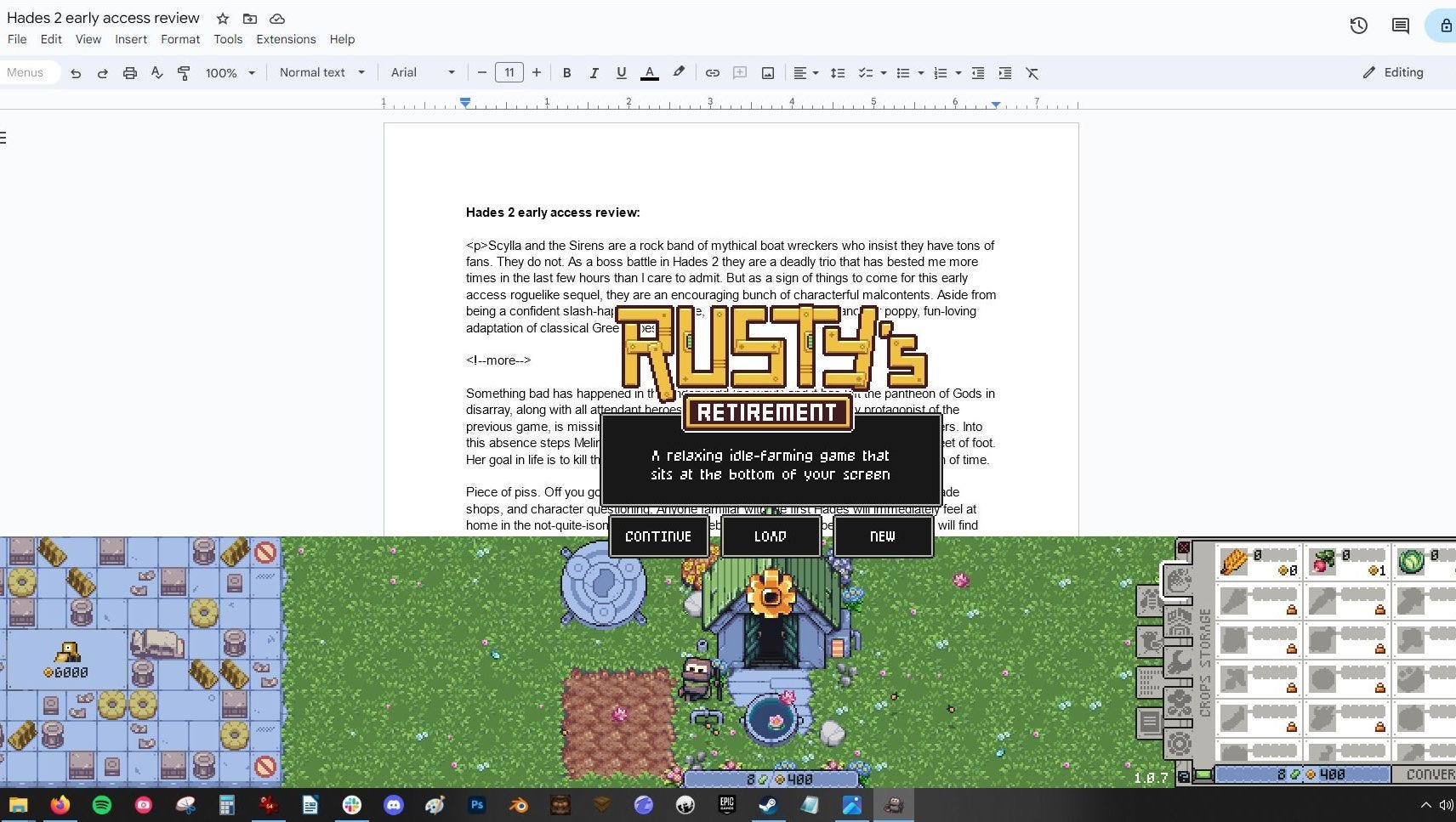Zobrazení pro čtení
Can you play Rusty's Retirement while at work and still get work done?

I'm playing Rusty's Retirement as I type this article. This cute farming sim runs at the bottom of your screen as you go about your working day. You can plant crops, hire watering robots, harvest blueberry bushes, raise pigs, all while validating the spreadsheets from Paula in accounts. Paula! Where are the running totals!? I can't find the running t- oh, they're under the turnips. Sorry, Paula. My bad.
But can you actually play "idle games" like this while getting your work day done? Aren't they distracting and obstructive? These are important questions. I plan to find the answers by playing Rusty's Retirement while simultaneously - and dutifully - completing days of work. Let's go!
California's Leaders Still Ignoring State Pension Debt

When arguing about whether the Treasury needed to take urgent action to deal with soaring federal debt in the 1980s, the late former chairman of the Council of Economic Advisers Herb Stein coined Stein's Law. It was simple and obvious: "If something cannot go on forever, it will stop."
I hate to pick nits with such an esteemed economist, but I'll offer Greenhut's Corollary: "Never underestimate politicians' ability to kick the can down the road." In 1986, federal debt was $2.1 trillion. In 2024, the debt is $34 trillion. Debt spending of this magnitude cannot go on forever, but it can fester for a long time and cause economic damage in the process. But, yes, it probably will stop eventually.
I thought of Stein's oft-cited quip when pondering California's pension crisis. A recent CalMatters report reminds us the state never has gotten its pension debt under control and that Gov. Gavin Newsom and the Legislature keep making the problem worse: "More generous-than-expected raises for California state workers are nudging up the cost of public employee pensions."
Back to my corollary: The report adds that Newsom "sidesteps the growing cost of CalPERS pensions" by using an accounting gimmick. The California Public Employees' Retirement System is only 72 percent funded, which means it only has 72 cents on the dollar to pay for the promised pensions—and they are one of the state's senior obligations. If the state budget ever collapses, government retirees are at the top of the list to get paid.
Per CalMatters, the Legislative Analyst's Office questions whether Newsom's shifting of funds from paying down CalPERS debt toward funding next year's pension costs runs afoul of Proposition 2, the 2014 ballot measure requiring the state to pay down certain debts. But let's not get too deeply into the weeds. The point: Even as the state's pension debt continues to spiral, Newsom and the Legislature won't tackle the problem head on.
Peruse the state legislative website and you'll find lawmakers fixated on every miniscule concern—concert ticket monopolies, landlord pet policies, healthcare wages, social-media age-verification policies—but nothing dealing with pension costs. The reason is obvious. The state's public employee unions rule the roost in the state Capitol and lawmakers better not touch their pensions.
Most normal people find pension reform to be mind-numbing. I'm not particularly normal, having written a While most Californians will depend on Social Security and meager savings for their Golden Years, the state's public employees will retire at ages 50-57 with 60 to 90 percent of their final years' inflated pay. If you think that we're "all in it together," then peruse the total compensation numbers on Transparent California. You'll find the average local firefighter earns well over $200,000 a year and pages of police sergeants with packages in the 400s and above. This comes at a cost: fewer public employees providing services, higher taxpayer-funded debt, and higher taxes. Note the large number of local tax measures on every ballot. Officials sell them as ways to improve public safety, upgrade parks, provide affordable housing, and fix the roads. But money is fungible. The growth in pension costs is fueling these tax grabs. These costs are "crowding out" spending on public services. A dozen years ago, pension reformers predicted, a la Stein, that this could not go on forever. Some believed the state's then $30-billion-plus deficit would lead to fundamental budgetary changes. Local governments and voters—even in liberal jurisdictions such as San Jose—passed pension-reform measures that reduced pension formulas (or limited pensionable pay) in the face of budget cutbacks. But they ultimately lost every battle. The courts rebuked San Jose's measure based on the California Rule, which refers to a series of court interpretations claiming that governments can't reduce pensions even going forward unless they provide something of equal or greater value in return. The California Supreme Court sidestepped that issue when it had a chance to change the rule. A union-friendly state agency derailed San Diego's effort at reform. In the end, Gov. Jerry Brown passed a useful but exceedingly modest pension reform law and spearheaded large tax increases to fix the budget deficit he faced. The pension reform movement lost steam. As usual, the unions flexed their muscle in the Capitol, in the courts, and in the state's administrative agencies. Reformers tried and failed—and since then talk about serious reform has been verboten in Sacramento. Can this go on forever? Probably not. The pension problem isn't going away, but neither is the power of the unions or the desire of the state's leaders to delay the reckoning for another day. This column was first published in The Orange County Register. The post California's Leaders Still Ignoring State Pension Debt appeared first on Reason.com.

Beautiful new idle farming sim hits 100,000 sales in just five days

Farming simulators often require a lot of attention and thought, belying their cosy aesthetics and gentle, relaxing music. Even a game like Stardew Valley can feel like a part-time job occasionally. Rusty’s Retirement effectively sidesteps this issue. Not only is it a peaceful, pastoral farm and building game, it only occupies a portion of your monitor, allowing you to split your attention between your crops and anything else on your desktop. Little wonder it's been such a huge success, selling 100,000 copies in a matter of days.
This farming sim sits at the bottom of your screen while you kid yourself you're doing other things

Steam is lousy with farming sims that will absolutely destroy your productivity by ensnaring you within a compulsive loop of reaping and sowing. Rusty's Retirement explicitly promises a less engrossing experience: it's a farming sim that "sits at the bottom of your screen while you do other things."
